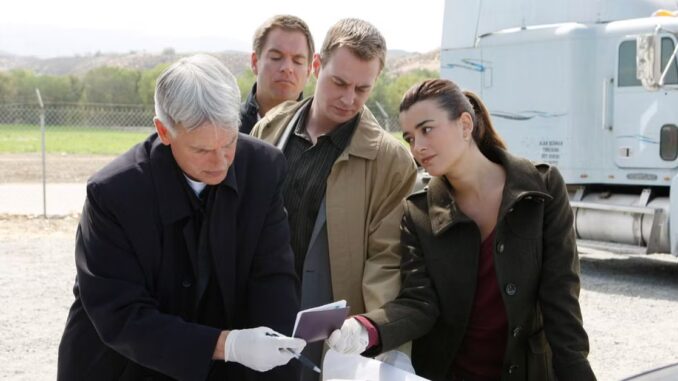
When NCIS first premiered in 2003, it didn’t look like the global TV phenomenon it would eventually become. In its earliest days — back when it was just a spinoff of JAG — the series had modest ambitions, low ratings, and a tone that leaned more toward the procedural than the personality-driven.
But according to Mark Harmon, who headlined the show for nearly two decades as Special Agent Leroy Jethro Gibbs, NCIS was supposed to be something very different from the “murder-a-week” format it’s now known for. In fact, the series that’s since inspired five spinoffs — including the new prequel NCIS: Origins — was initially sold to him as a show based entirely on real Navy and Marine Corps cases.
The Real Premise Behind ‘NCIS’ Wasn’t About Weekly Murders
When Harmon first signed on in 2003, he wasn’t promised another standard CBS procedural. “When I first joined the show, part of what they sold me on was that this was all going to be based on real cases,” Harmon told The Hollywood Reporter. “But pretty soon, it settles into murder-a-week because that’s television, right?”
That pivot, he said, happened early. By the time Gibbs and his team found their rhythm, the show had leaned into the tried-and-true formula of case-of-the-week storytelling—a structure audiences recognized and kept tuning in for. It worked as NCIS slowly climbed the ratings, eventually becoming the most-watched show on U.S. television and spawning an empire.
Still, Harmon’s original interest was in something more grounded — something closer to the real Naval Criminal Investigative Service. In recent years, he’s been channeling that interest through nonfiction writing, co-authoring Ghosts of Honolulu and Ghosts of Panama with former NCIS advisor Leon Carroll Jr. Both books explore real naval investigations, exactly the kind of stories Harmon thought NCIS would tell.

NCIS in Real Life Isn’t Quite What You See on TV
To be fair, Harmon wasn’t wrong that the real NCIS has stories worth telling. The actual Naval Criminal Investigative Service, headquartered in Quantico, Virginia, investigates crimes tied to the Navy and Marine Corps — from counterterrorism and economic fraud to espionage and internal misconduct.
“It is entertainment,” NCIS communications director MaryAnn Cummings told USO.org of the show in 2016. “It’s the Hollywood version.” Real NCIS agents, she explained, are more like detectives than action heroes, and they rarely find themselves in the middle of car chases or jurisdictional turf wars.
The TV show also dramatized the lab work — there’s no real-life equivalent to Abby Sciuto’s (Pauley Perrette) goth lab, nor a “Ducky” (David McCallum) performing autopsies for the agency. “That’s one of those entertainment things that everybody chuckles at,” Cummings said.
Still, the real agency appreciates the attention. The show’s global popularity has raised public awareness of what NCIS actually does, even if the on-screen version is more flash than fact.
How ‘NCIS’ Evolved Into the Juggernaut It Is Today
That evolution from realism to entertainment wasn’t smooth. As Harmon remembered, NCIS didn’t start off as a hit. “There were a lot of changes in those first three or four years,” he said. “People don’t realize that, but this show didn’t jump out.”
Eventually, NCIS leaned into its ensemble — balancing Gibbs’ stoic leadership with humor, camaraderie, and a found-family dynamic. By Season 3, the formula clicked. Fans stayed for the banter as much as the cases, and the series cemented its tone: part procedural, part workplace dramedy, all wrapped in military grit.
The real-agency premise may have been shelved, but its influence lingers. Technical advisor Carroll Jr., who served in the Marines, still helps ensure authenticity where it counts — in dialogue, procedure, and the show’s moral center. “You’ve got a lot of individuals who work very hard to do the right thing every single day,” Cummings said of both the real and reel teams. “Much like the military unit becomes a family … NCIS is a family.”
Would a ‘Real-Case’ Version of ‘NCIS’ Have Worked?
If NCIS had stuck to dramatizing real Navy and Marine Corps cases, it might’ve been more documentary drama than procedural comfort TV. It also might have been too grim.
As one fan noted online, later seasons already stretched believability: “The forensics seem a little flimsier and more like magic, and the series just requires more suspension of disbelief.” That suspension, though, is exactly what made NCIS work. It gave audiences larger-than-life heroes, high-stakes mysteries, and a sense of continuity that kept them coming back week after week.
Now, with NCIS: Origins revisiting Gibbs’ early years in 1990 — when the agency was still called NIS — Harmon has come full circle. As an executive producer and narrator, he’s finally exploring the grounded, historical version of the agency that first captured his imagination.
“It’s been historically interesting for me,” Harmon said. “You’re learning about the agency in a different way than I had in the past. And looking at it in a different way, too.” Two decades later, he’s getting the show he was sold on — just not in the way anyone expected.